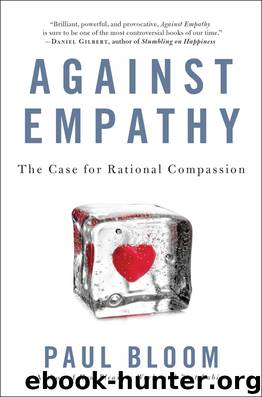Against Empathy by Paul Bloom

Author:Paul Bloom
Language: eng
Format: epub
Publisher: HarperCollins
Published: 2016-10-26T16:00:00+00:00
INTERLUDE
Empathy as the Foundation of Morality
Perhaps empathy is like milk. Adults don’t need milk; we do fine without it. But babies need milk to grow.
Many of my fellow psychologists—and many philosophers, and many parents—see empathy as the developmental core of morality. They see babies as highly empathic creatures—empathic in the Adam Smith sense of naturally resonating to the feelings of others. As babies grow, this empathy-based morality gradually expands and gets more abstract, so that ultimately there is caring without stepping into others’ shoes, as well as the capacity for objective moral reasoning.
One appeal of this view is its simplicity. To explain morality, all you need to attribute to babies is a single thing—the spark of empathy, the capacity to feel the feelings of others. Everything else follows from this spark. This is a pleasingly minimalist solution and it will appeal to those who are loath to attribute too much mental richness to such a tiny brain.
This empathy-first account was endorsed, in somewhat different forms, by two of the great philosophers of the Scottish Enlightenment: Adam Smith and David Hume. And it’s been endorsed as well by many contemporary developmental psychologists. Martin Hoffman, for instance, defines empathy in a way that fits with how we are talking about it here—“an affective response more appropriate to another’s situation than one’s own”—and presents a detailed theory of its development, arguing that empathy is the foundation of morality. For him, empathy is “the spark of human concern for others, the glue that makes social life possible.”
If this turns out to be right, it need not clash with the arguments I’ve been making so far. Even if empathy is foundational for children, it might be useless or even detrimental for adults. One could write a book called Against Milk, after all, while acknowledging that milk is just fine for babies.
I’m against empathy, but I do believe that people feel compassion. We want to help others and want to employ our hearts and minds to achieve good ends. There are those who doubt even this, who reject the notion that we possess any sort of kind or compassionate motivation. They think that people are ultimately selfish and self-interested.
Of course, these cynics have to concede that we sometimes help others, even strangers. We give to charity, donate blood, post helpful reviews on Internet sites, and so on. But the claim is that there is always an ulterior motive. We wish to improve our reputations, or get others to help us in the future, or attract mates and friends. Or perhaps we want to feel good about ourselves, or go to heaven after we die. Our intentions are never pure, and we’re fooling ourselves if we think they are. As Michael Ghiselin put it: “Scratch an altruist, and watch a hypocrite bleed.”
Many brilliant people have come to this conclusion. The story goes that Thomas Hobbes was walking through London with a friend when Hobbes stopped to give money to a beggar. The friend was surprised and pointed out to Hobbes that he had long argued for the fundamentally egoistic nature of humanity.
Download
This site does not store any files on its server. We only index and link to content provided by other sites. Please contact the content providers to delete copyright contents if any and email us, we'll remove relevant links or contents immediately.
Rewire Your Anxious Brain by Catherine M. Pittman(18628)
Talking to Strangers by Malcolm Gladwell(13338)
The Art of Thinking Clearly by Rolf Dobelli(10401)
Mindhunter: Inside the FBI's Elite Serial Crime Unit by John E. Douglas & Mark Olshaker(9305)
Becoming Supernatural by Dr. Joe Dispenza(8191)
Change Your Questions, Change Your Life by Marilee Adams(7725)
Nudge - Improving Decisions about Health, Wealth, and Happiness by Thaler Sunstein(7684)
The Road Less Traveled by M. Scott Peck(7579)
The Lost Art of Listening by Michael P. Nichols(7485)
Mastermind: How to Think Like Sherlock Holmes by Maria Konnikova(7310)
Enlightenment Now: The Case for Reason, Science, Humanism, and Progress by Steven Pinker(7300)
Win Bigly by Scott Adams(7178)
The Way of Zen by Alan W. Watts(6587)
Daring Greatly by Brene Brown(6494)
Big Magic: Creative Living Beyond Fear by Elizabeth Gilbert(5733)
Grit by Angela Duckworth(5589)
Ego Is the Enemy by Ryan Holiday(5400)
Men In Love by Nancy Friday(5223)
The Laws of Human Nature by Robert Greene(5146)
